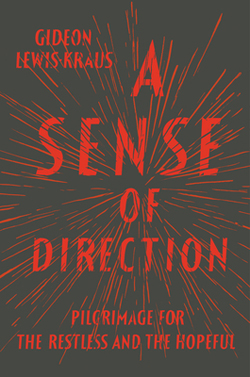A Sense of Direction: Pilgrimage for the Restless and the Hopeful
by Gideon Lewis-Kraus
reviewed by Hope Reese
At the age of twenty-seven, Gideon Lewis-Kraus was at a crossroads, unsatisfied with life in San Francisco and New York and everyone’s preoccupation with money, status and “standing in line for cupcakes,” and with Berlin, where he moved when he became tired of San Francisco, and its over-indulgent, easy lifestyle and pre-dawn drunken escapades. To escape from the abyss of Berlin, Lewis-Kraus, a magazine writer and critic, set off on three pilgrimages—El Camino de Santiago; Shikoku, a Japanese circuit of eighty-eight temples; and Uman, a Rosh Hashanah trip in Ukraine—and a book was born. A Sense of Direction is an intimate, reflective travelogue and a meditation on which parts of life are choice, which are obligation, and whether one is better than the other.
Lewis-Kraus’s anxiety about how to live his life is communicated thoughtfully and his interior monologue is written with great transparency. But even more fun to read is the sparkling dialogue between Lewis-Kraus and Tom Bissell, a fellow magazine writer and friend with whom he toured Spain. This first pilgrimage with Bissell is a highlight of the book: honest, fresh, in-the-moment. Bissell also sheds light on Lewis-Kraus’s quirks and insecurities; after all, it is easier to trust his friend’s version than Lewis-Kraus’s own, inherently biased, account of himself.
It is easy to become invested in this friendship, more so than in Lewis-Kraus’s fraught relationship with his father, who came out of the closet and left the family years ago, according to his son. Lewis-Kraus’s final pilgrimage to Ukraine with his father is an attempt to come to grips with this family history. He is surprised to learn that his father doesn’t regret the past, but sees his former life, married to the author’s mother, and his current life, in a long-term partnership with a man, as equal parts of a whole.
There is some debate about how to classify A Sense of Direction, and Lewis-Kraus readily admits that his work doesn’t fit neatly into a genre. Many current memoirs have a soul-baring quality that Lewis-Kraus doesn’t even attempt, but the book is not quite a travelogue either. Encounters with others aren’t the focus; instead, it’s exploratory, philosophical, essay-like.
While Lewis-Kraus paints a beautiful picture, he does brush over some important details. One of my favorite parts of the book comes near the end, when he reveals, “I have a way of, say, asking a stranger for directions and seeming as though I’m calling him an idiot.” This admission is a rare gem in a book that otherwise glosses over the author’s less desirable traits. It’s also worth noting that his experience is colored by unacknowledged privilege—the kind that takes for granted that family members can travel across the world to spend time together. And he exaggerates his “sloth” in Berlin; he was there on a Fulbright scholarship, after all, spending a lot of time on this book, and writing various reviews.
But despite the fact that he may not have been quite as directionless as he makes himself out to be, Lewis-Kraus writes about universal dilemmas with elegance and force. A Sense of Direction inevitably stirs up feelings of introspection—and that, it seems, is its intention. “The line between obligation and desire is rarely clear . . . each step forward is some blurry function of choice and necessity . . . there might, in the end, not be so great a difference between saying ‘I felt like it’ and saying ‘I had to.’”
Published on October 3, 2013

